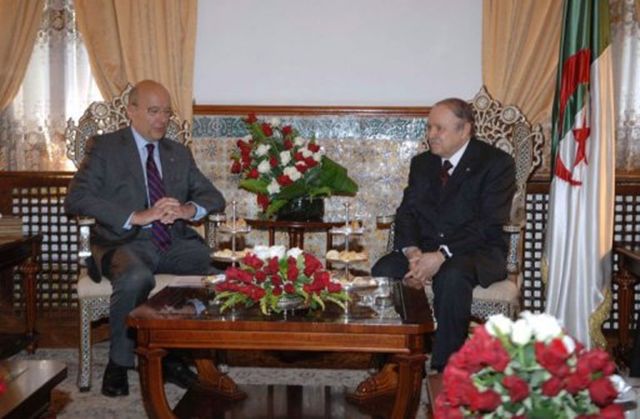
Franco-Algerian Security Rapprochement is Threatened by Divergent Views on Libya
Publication: Terrorism Monitor Volume: 9 Issue: 26
By:

A series of recent meetings in Algiers have been devoted to creating a “special partnership” between France and its former colony of Algeria, based on ties unifying the countries in terms of history, proximity and density of human relations (Jeune Afrique, Jun 14). French Foreign Minister Alain Juppe’s recent visit to Algeria (the first visit by a French foreign minister since 2008) for two days of high level meetings with Algerian authorities officially marked a détente between the two countries, whose relations have been strained over the past few years. During a visit that followed an invitation from the Algerian foreign minister, Juppe met with Algerian Prime Minister Ahmed Ouyahia, Foreign Minister Mourad Medelci and President Abdelaziz Bouteflika in discussions on a number of bilateral issues, particularly those presented by the changing strategic picture of the Mediterranean region. In a press conference following these meetings, Juppe stressed the need to look to the future concerning the thorny issue of Algeria’s colonial past (AFP, Jun 16; Le Figaro, Jun 16). Colonial memories have been rekindled in Algeria by the recent NATO intervention in Libya, in which France is playing a major frontline role.
One issue where Algiers and Paris already share a close relationship is security cooperation in the Sahel region of Africa. Both countries share concerns over the growing role of al-Qaeda in the Islamic Maghreb (AQIM) in the Sahel, which is composed of states whose ability to effectively control their territories is very low. France, as the major external political and economic player in the region, wants to reduce the impact that the activities of al-Qaeda could have on French companies operating there, as well as on its citizens living and travelling in the region. AQIM still represents a major security concern for Algeria, even if its activities and presence on Algerian territory are now much less prominent than in the past. Juppe has praised Algerian efforts to increase regional cooperation against this threat, stressing French availability to attend future meetings of the countries involved in this cooperation (El Moudjahid, June 17). Increasing economic cooperation is another feature of the common agenda. The recent economic partnership forum held in Algiers, the first of its kind, is a clear example of the common willingness to deepen the French-Algerian relationship beyond the common misperceptions and historical resentments (Algérie Plus, May 16; La Tribune, May 31).
Such resentments came to the surface in May, when Franco-Algerian relations were particularly disturbed by the attendance of Sadek Bouguetaya, a leading member of Algeria’s ruling Front de Libération Nationale (FLN) and primary aide to FLN president Abdelaziz Belkhadem, at a May 8 gathering in Tripoli of Libyan tribal leaders sponsored by the Qaddafi regime. In a speech broadcast by Libyan state television, Bouguetaya expressed the FLN’s support for the Libyan regime, described the opposition as “pawns of the West,” asserted that “violence in Libya benefits the European powers and America,” and concluded by suggesting that the Libyans would defeat France just as the Algerians had defeated the French in 1962 (Echorouk [Algiers], May 8; Ennahar [Algiers], May 7; al-Jazeera, June 26).
With France and Algeria presumably having dealt with these provocative statements, there still remains a major point of friction which has the potential to harm the future of the new Franco-Algerian entente – Libya and its future (El Watan, 17 June). After meeting with his Algerian counterparts, Foreign Minister Juppe clearly said that it is true that UN Resolution 1973 does not demand the departure of Mu’ammar Qaddafi, but France desires it. Juppe emphasized the argument that Qaddafi lost his legitimacy after using guns and other weapons against his own population (Ennahar, June 17). Algeria, on its part, has stressed the need to reach a political solution to the Libyan stalemate, based on the position taken by the African Union. In a recent trip to Luxembourg for meetings with European Union officials, Foreign Minister Medelci stressed the Algerian commitment to respect the UN resolution in a literal sense (El Moudjahid, June 21).
France has now officially confirmed it has provided rebels with light weapons supplies, though it did not inform its allies about this move. The supplies began in early June and are a further confirmation of French determination to break the stalemate of the conflict as well as its intention to accelerate efforts to eliminate Qaddafi. The move will likely fuel new criticisms from those countries believing that NATO and its allies have already gone beyond the provisions of UNSC Resolution 1973 (Le Figaro, June 29; Reuters Africa, June 30; El Watan [Algiers], June 30) .
Even though the disagreement over implementation of the Security Council resolution remains, Juppe has made a diplomatic concession to Algerian interests by clearly stating that France does not believe the allegations made by the rebel Transitional National Council (TNC) concerning an Algerian role in supporting Qaddafi with mercenaries and weapons (Tout sur l’Algérie, June 16). Strategic interests on this issue are divergent and the distance between them has the potential to harm renewed cooperation in the future.
Algeria fears that prolonged instability in Libya could turn the country into a major safe haven and weapons market for AQIM. It is also concerned over the possible domestic effect the example of Qaddafi’s overthrow could have on its own political stability. The possible increase of the influence of France and some of Algeria’s regional rivals (such as Morocco and Egypt) over Libya is viewed in Algeria as a major threat to its interests (see Terrorism Monitor, May 29).
France, on the other hand, is strongly committed to the overthrow of Qaddafi, which it perceives as a major opportunity to increase its international status. Though domestic motives are important to explain France’s tougher stance on Libya, even more important are geopolitical, strategic and economic interests. A tougher stance on Libya has provided an opportunity to reduce the impact that the collapse of Tunisian and Egyptian regimes have had on France.
Pushing for a military intervention in Libya and being the most critical anti-Qaddafi voice in the international community was instrumental to France in reacquiring a pro-active political initiative in the Arab world, since French political moves related to the Arab uprising had been mostly reactive until that point. Abandoning Qaddafi, even though France signed several agreements with him over the past few years, and being the first country to recognize the TNC represents a sort of “political bet” over Libya’s future, and is aimed at increasing France’s regional influence. Given the highly personalized foreign policy of Qaddafi, it is likely that Libya’s foreign policy will be completely different should the Colonel’s regime collapse. France could then play a major political and economic role in a post-Qaddafi Libya. Strategically, that means boosting its “ring of influence” in the Maghreb, from Morocco to Libya, which will better serve French interests in the Mediterranean as well as enhance its position in Africa, a continent in which Paris still has great interest and influence.
Historically, relations between Paris and Algiers have never been easy: colonial memories, historical resentment and the peculiar features of post-independence Algerian foreign policy have made this relationship complex and at times unstable. In 2010, some signs of improvement started to emerge, while the visit of Juppe to Algiers has sealed this improvement. Security cooperation in the Sahel, as well as economic and energy interests, represent those issues in which a greater convergence can be achieved. Libya’s future, instead, represents a thorny issue which has the potential to again harm the relationship between the two countries. France is at the forefront of the international coalition against Qaddafi; it wants to acquire a new position of primacy in the Mediterranean and Africa as well as to re-establish the historical profile of France as a normative power, supporting and defending those values of freedom which France considers part of its historical background. Algeria, instead, is concerned about a prolonged state of instability in Libya as well as the possible domestic effects of a Qaddafi fall from power.





